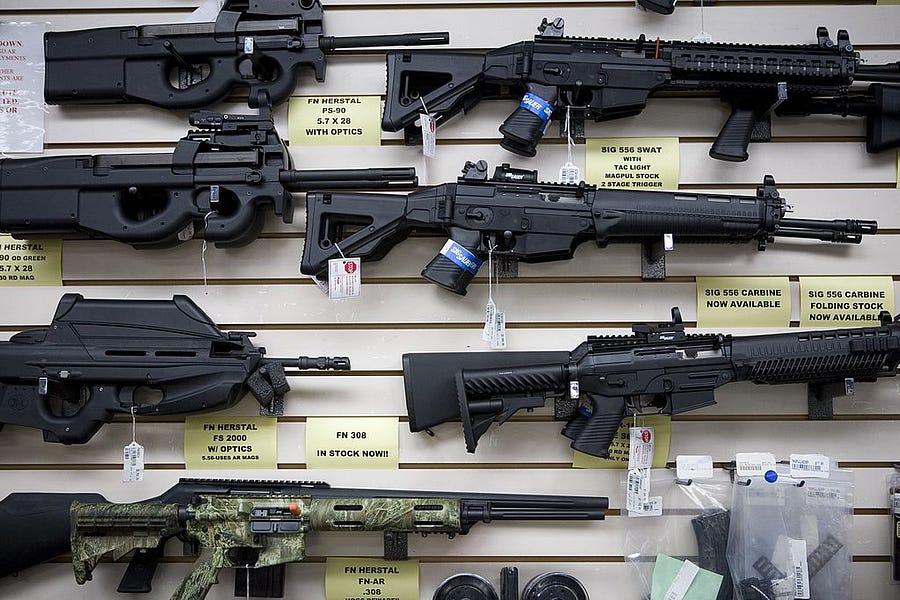Earlier this month, the Mexican government filed an unprecedented lawsuit against U.S. gun manufacturers. The claim: Manufacturers are negligent in their sales and bear responsibility for the flow of weapons across the U.S.-Mexican border. Those weapons, they say, arm the cartels and contribute to the skyrocketing number of violent deaths—17,000 last year alone. Not surprisingly, the manufacturers reject such claims. They say they strictly follow American law. They argue that the porous nature of the border and the corruption of officials on the Mexican side are the problem.
The manufacturers are right on both counts. But the flow of illicit weapons south of the U.S. border is not Mexico’s fault alone. Guns in America are sold, by and large, by the book. But organized crime elements have found ways to purchase large quantities of weapons on the U.S. market legally through illicit actors who take advantage of insufficient custom controls, corrupt border officials, and freight companies that dispatch entire armories to Central and South America for the benefit of criminal syndicates and violent gangs. This happens despite a U.S. Supreme Court ruling last year banning straw purchases—guns bought on others’ behalf.
Two years ago, a joint international police operation nicknamed Patagonia Express exposed and dismantled a fraudulent scheme to ship weapons to criminal organizations in Argentina and Brazil. During the operation, U.S., Argentinian. and Brazilian law enforcement arrested 25 people and seized thousands of weapons. Among the arrested: an elderly couple from South Florida, who bought weapons locally, disassembled them, and then sent their components to Argentina in mislabeled shipments through the U.S. Postal Service.
Patagonia Express uncovered not only a scheme but also a method. A similar case involved a small Paraguayan import company, Paco Internacional, currently being prosecuted in Paraguay. In March 2016, local authorities inspected a container, just arrived from Miami, that included merchandise labeled as electronics. Inspectors found weapon parts instead. It took five years to mount a case against the recipient of the weapons Paco was importing into Paraguay. Officials today believe the buyer was a local businessman suspected of being involved in organized crime. Paraguayan prosecution documents allege that he bought the weapons online from U.S. suppliers and had them shipped to a Florida address. The freight forwarder and its Florida-based counterpart did the rest.
In the Paco Internacional case, the online purchase of weapons underscores how easy it can be for criminals to procure weapons in the U.S. if they have accomplices. The U.S. sellers did not violate the law: They shipped their products to a U.S. address. And given the small number of arms involved, the case hardly seems worth highlighting as a problem here in the United States.
However, the role of local facilitators for criminal networks should not be ignored. The Miami-based freight company that sent the weapons to Paco belonged to a Brazilian national who was arrested in Brazil in 2017 for contraband. Paco also traded with other South Florida-based companies implicated in a suspected Hezbollah trade-based money laundering scheme that is today being prosecuted in Miami. Indeed, organized crime often looks to U.S. based facilitators with an eye toward circumventing the holes in our legal system.
Criminal syndicates find it easier (and possibly cheaper) to buy weapons legally in the U.S. market because there are American intermediaries who are willing to break the law by exporting them under false documentation. In other words, there may be negligence and even corruption at the border, but there is also a systemic problem here at home.
The volume and type of weapons seized over the years suggests that the Mexican government is not entirely wrong to look at America as a source of weapons for the cartels. However, it appears that the negligence alleged may be less with manufacturers and more with gun stores. Similarly, blaming border control for the problem may also fail to help. Intermediaries can circumvent the border altogether with these schemes.
This does not absolve America from wrestling with the broader problem of American weapons finding their way into the hands of international criminal organizations, and the devastating long-term consequences for societies in the southern hemisphere this trafficking begets. What happens there does not stay there, either. Immigrants fleeing the violence south of our border continue to pose policy challenges here.
Even if the Mexican legal complaint is dismissed, American policymakers must independently take action to stem the illicit flow of deadly weapons to transnational organized crime. This may require states to institute more stringent controls on internet sales of weapons and other measures to reduce straw purchases and ensure that buyers are not stockpiling weapons with a view to illicit transfers, as the Patagonia Express case shows. It will also require the federal government to strengthen monitoring of commercial shipments at ports and postal shipments. The U.S. cannot solve the plague of public officials’ corruption south of its border. But it can make sure that criminals do not exploit our constitutional freedoms to foment violence abroad.
Emanuele Ottolenghi is a senior fellow at the Foundation for Defense of Democracies, a nonpartisan think tank in Washington, D.C.






Please note that we at The Dispatch hold ourselves, our work, and our commenters to a higher standard than other places on the internet. We welcome comments that foster genuine debate or discussion—including comments critical of us or our work—but responses that include ad hominem attacks on fellow Dispatch members or are intended to stoke fear and anger may be moderated.
You are currently using a limited time guest pass and do not have access to commenting. Consider subscribing to join the conversation.
With your membership, you only have the ability to comment on The Morning Dispatch articles. Consider upgrading to join the conversation everywhere.